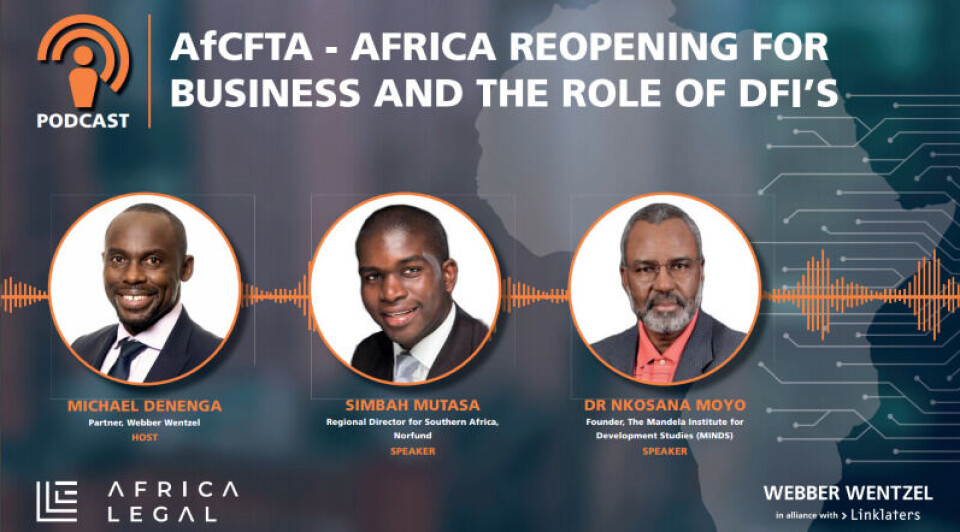Copyright : Re-publication of this article is authorised only in the following circumstances; the writer and Africa Legal are both recognised as the author and the website address www.africa-legal.com and original article link are back linked. Re-publication without both must be preauthorised by contacting editor@africa-legal.com
Creating the right ecosystem

The forthcoming African Continental Free Trade Area (AfCFTA) is set to forever change the commercial and trade landscape across Africa by cutting red tape, reduce trade tariffs, creating jobs and enhancing regional cooperation across 54 nations and creating the largest free trade zone in the world.
In the latest Webber Wentzel AfCFTA Insights Podcast, Michael Denenga, a partner specialising in finance and investment funds, discusses this new reality with the following guests:
- Dr. Nkosana Donald Moyo, PhD, former Vice President and COO of the African Development Bank (AfDB), former Managing Partner of the Africa Business of Actis Capital LLP and former Associate Director of the World Bank’s International Finance Corporation (IFC) and founder of the Mandela Institute for Development Studies (MINDS)
- Simbah Mutasa, Regional Director of Southern Africa at DFI, Norfund and has formerly held senior roles at Citi both (Johannesburg and London) and Liberty Global. While at Citi he led the execution of transactions totalling over US$10bn across Sub-Saharan Africa.
The opportunities of the AfCFTA are staggering, with the World Bank predicting the AfCFTA may lift ‘30 million people out of extreme poverty and raise the incomes of 68 million others who live on less than $5.50 per day.’ The potential positive gains are unmatched in modern African economic history.
Issues with the current status quo range from the sheer inefficiency and cost of importing raw materials to the cost of capital. “Africa spends about $63 billion on food imports,’ says Webber Wentzel’s Denenga, “Africa needs to spend less on importing raw materials.”
Engineering sectoral potential
“As a young African and as someone that is perennially optimistic, I am desperate to see this continent achieve its full potential,” says Mutasa.
The AfCFTA is aiming to help ensure the growth of this potential by prioritising financial services, travel, transport, communication and business services, which Mutasa refers to as “anchor sectors” that are “bedrocks.”
He sees financial services as a cornerstone for driving development, providing capital into economies and helping to manage the broader costs of this capital. He suggests also focussing on manufacturing, a “multiplier industry” which adds value to industry supply chains upstream and downstream in areas such as coal, logistics wholesaling, marketing and beyond.
Creating the right ecosystem
With the great promise of the AfCFTA and the goodwill behind it, comes the high stakes responsibility of getting the fundamentals right. Dr. Moyo poses a central question here: “How do you bring it to reality and make it succeed?” He suggests a phased approach.
“The AfCFTA is a very important platform that has been conceptualised…while the concept is laudable and a lot of the anticipated numbers are big, these things are achievable only if certain implementation measures are taken care of,” he says.
Moyo suggests that the way to keep up the positive momentum that has been building, is to first ensure a feeling of inclusivity amongst all participating African nations. “If participants feel left behind,” he says, “or don’t have skin in the game, then their commitment to making this succeed is going to be compromised.”
Mutasa agrees, saying “When it comes to getting the AFCTA accurate, we have to take an ecosystem approach, and everyone has to be a stakeholder in that approach.”
So where to begin? The key question according to Moyo is, “what is the structure – how do you build it so that this can happen?”
First, you need what Moyo describes as “vanguard members” or 5-10 countries with more established economies who can lead by example. These members negotiate and analyse their capacity to exchange value in a system to see where they could start in terms of exchanging goods and services.
Furthermore, these countries will create momentum and clarity about the door staying open to other countries to join when they are ready. “Don’t wait for everybody from day 1 – I think that’s not doable,” he says. This experience would gradually allow the accrual of experience and learning how to acquire skills in order to tackle harder things and ensure you have the skills to manage risks.
This phased approach could be characterised as modular, creating a “whole system without all the pieces being in place from day one – like Lego – you can build out but put the pieces together”, suggests Moyo. This clarity from inception would lead to transparency towards all who want to join.
A chance to take stock
The pandemic has delayed the implementation of AfCTFA and as it continues, the effects are still being felt. Mutasa says “in the delay caused by the pandemic, people now have a chance to take stock and figure out what is going on and how it impacts thinking. It’s a good opportunity to reflect on where we are ultimately and the end goal of what we are solving with the AfCTFA.” He suggests that part of this thinking could be a reflection around centralisation, manufacturing or product facilities.
Denenga hopes that we can get ''the essentials in place'' in order to create a ''synergistic ecosystem '', this is an excellent opportunity that Africa cannot miss out on.''
To listen to the full Podcast episode, click here.
To join Africa Legal's mailing list please click here
